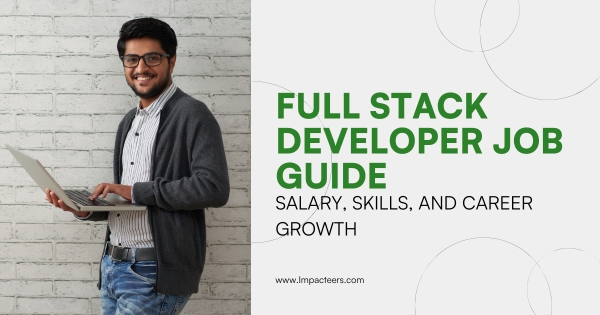If you’ve been scrolling through job sites lately, you’ve probably noticed something: almost every other tech listing is looking for a full stack developer. It’s one of those roles that keeps showing up everywhere.
And honestly, it makes sense. Businesses today don’t just want a good-looking website. They want something that loads fast, works on phones, keeps data safe, and doesn’t crash when people are actually using it. Instead of hiring one person for the front end and another for the back end, many companies would rather bring in one person who can do both.This is the place where full stack developers come – and that is why the role has become one of the hottest jobs in it.
In this guide, we are going to break what a full stack developer actually does, the skill you need, what the salary looks, and how can the career grow over time. And because I know most of you are also thinking about jobs, I’ll share where you can actually find openings too.
Viist Us >>>> https://www.impacteers.com/home
What Exactly Is a Full Stack Developer?
Let’s make it simple. Imagine you’re using a food delivery app. The page where you browse menus, add items to your cart, and click “order now”—that’s the front end. The system that checks stock, stores your order, processes your payment, and pings the restaurant? That’s the back end.
Now, a full stack developer is the person who can do both sides. They design the part you see and use, and they also build the invisible engine that makes everything work.
In everyday terms:
- Front end → What you see (design, buttons, navigation).
- Back end → What you don’t see (databases, servers, security).
- Full stack → Someone who connects both and makes the entire app run smoothly.
Basically, they’re the all-rounders of web development.
Full Stack Developer vs. Software Engineer
Now, here’s a question that trips up a lot of people: isn’t a full stack developer just another name for a software engineer? The short answer—nope.
Here’s the breakdown:
- A software engineer is a broad title. They might build mobile apps, computer programs, or even systems for banks.
- A web developer usually focuses on websites or web applications and can either be front-end or back-end.
- A full stack developer is a type of web developer who knows how to handle both ends.
So yes, a full stack developer is also a software developer, but not every software developer is a full stack developer. Think of it as a square-and-rectangle situation.
Why Are Full Stack Developers in Such High Demand?
This part is easy to understand when you look at it from a business perspective.
- Startups love them – Small companies don’t have the luxury of big tech teams. If they can find one person who can design the front end and code the back end, that’s a win.
- Big companies need them too – Even in large corporations, full stack developers act as connectors. They understand how each side of a system affects the other, which helps avoid miscommunication.
- They’re flexible – Tech is always changing. Businesses want people who can pick up new tools and switch gears quickly.
Put simply: full stack developers save companies time and money while keeping projects moving. That’s why the demand has exploded and doesn’t seem to be slowing down anytime soon.
Roles and Responsibilities of a Full Stack Developer
Being a full stack developer isn’t just about knowing tools—it’s about what you actually do on the job. And let me tell you, no two days look exactly the same.
One day, you might be fixing a bug that’s breaking the checkout page. The next, you’re writing database queries to speed up loading time. And on another day, you’re jumping into a meeting with designers to tweak how a page looks.
Here’s a quick list of things full stack developers usually handle:
- Building responsive layouts with HTML, CSS, and JavaScript.
- Writing back-end logic with languages like Python, Node.js, or Java.
- Designing and managing databases (think MySQL, MongoDB, PostgreSQL).
- Testing code and making sure everything works across browsers and devices.
- Deploying projects using cloud services like AWS, Azure, or Google Cloud.
- Collaborating with designers, testers, and other IT professionals.
If this sounds like a lot, it’s because it is. But that’s exactly what makes the role interesting—you’re always learning something new.
Skills Every Full Stack Developer Should Have
Alright, let’s break this into two parts: the hard skills (tech stuff) and the soft skills (people stuff).
Technical Skills
- Front End Tools: React, Angular, Vue.js—these frameworks make building modern UIs a lot faster.
- Back End Frameworks: Node.js, Django, Ruby on Rails—pick one and get comfortable.
- Databases: SQL (structured) and NoSQL (unstructured) databases.
- Version Control: Git and GitHub to keep track of your work and collaborate.
- APIs: Knowing how to create and consume APIs is a must.
- Basic DevOps: A little knowledge of Docker, Kubernetes, and CI/CD goes a long way.
Soft Skills
- Problem-solving – You’ll face issues daily. Some small, some big.
- Communication – You’ll often need to explain techy stuff to non-tech people.
- Adaptability – Frameworks change fast. You can’t cling to one forever.
Think of it this way: tech skills get you the job, but soft skills help you keep it.
Education and How to Become a Full Stack Developer
Here’s the truth: you don’t always need a degree to land a job as a full stack developer. Sure, having a computer science degree helps, but plenty of people break into the field through other routes.
Different Paths You Can Take
- University Degree – Gives you strong fundamentals, but it’s time-consuming and expensive.
- Coding Bootcamps – Short, intense programs that get you job-ready in months, not years.
- Self-Taught – Tons of free resources exist (YouTube, FreeCodeCamp, Udemy). If you’re disciplined, this path works.
Certifications That Can Boost Your Resume
- IBM Full Stack Developer Professional Certificate (Coursera)
- AWS Certified Developer
- Google Professional Cloud Developer
These aren’t mandatory, but they do give recruiters extra confidence in your skills.
Salary: What Does a Full Stack Developer Earn?
Okay, let’s talk numbers—because that’s what most people really want to know.
The pay depends on your location, experience, and the company you work for. But here’s a rough idea:
- Entry-Level (0–2 years): Around $55K–$80K/year in the US (₹4–7 LPA in India).
- Mid-Level (3–5 years): $80K–$110K/year (₹8–15 LPA).
- Senior (6+ years): $120K–$160K/year (₹15–25 LPA).
And if you’re freelancing or working remotely for international clients, you might make even more. Some developers in lower-cost countries earn US-level salaries by working with global companies.
Career Growth Opportunities
The beauty of being a full stack developer is that you don’t get stuck in one role forever. You’ve got options.
Here are a few directions you can grow into:
- Tech Lead – Leading small teams and mentoring junior developers.
- Software Architect – Designing how systems are structured at a high level.
- Project Manager – Managing timelines and client expectations.
- Freelancer/Consultant – Running your own projects, often at higher pay.
This flexibility makes full stack development one of the most future-proof careers in IT.
Challenges in the Role
Okay, it’s not all sunshine. There are challenges too.
- Keeping Up – Frameworks change constantly. One year everyone’s using Angular, next year it’s React, then something new.
- Workload – Because you can do more, sometimes companies overload you with too much.
- Jack of All Trades? – Some developers feel stretched thin, not being “deep experts” in any one area.
But honestly, these challenges are also what make the role exciting. You’re never stuck doing the same thing every day.
How to Land a Job as a Full Stack Developer
Now the million-dollar question—how do you actually land a full stack developer job?
Here are a few solid steps:
- Build a Portfolio – Don’t just say you know coding. Show it. Create projects and put them on GitHub.
- Polish Your Resume – Use keywords like “full stack developer,” “software developer,” “web development,” and “IT professional.”
- Prep for Interviews – Be ready for coding tests, problem-solving questions, and even system design challenges.
- Network – Join tech meetups, LinkedIn groups, or online communities.
- Use the Right Job Platforms – Sites like Impacteers Jobs are great because they connect IT professionals with roles that actually match their skills.
Unlike generic job boards, Impacteers Jobs focuses on opportunities for developers, software engineers, and other IT specialists. If you’re serious about landing meaningful work, it’s worth checking out.
Resources to Keep Learning
The learning never stops in this field. Luckily, there’s no shortage of resources.
- FreeCodeCamp – Great for free hands-on learning.
- Udemy & Coursera – Affordable courses with structured paths.
- Stack Overflow – For troubleshooting (because let’s face it, you’ll be stuck at some point).
- YouTube Channels – Like Traversy Media, The Net Ninja, etc.

Conclusion
At the end of the day, being a full stack developer is about being versatile. You are not only building a beautiful front end or invisible back end – you are sure that the entire system works together. It is a career that pays well, challenges you to learn, and opens the doors for many future roles such as technical leads, architects, or even project manager.
If you are serious about stepping into this field, start construction of projects, fasten your skills, and start yourself again. And when it is time to find the right role, do not forget to check the impacter jobs. It’s a platform built for IT professionals like you, designed to help software developers, web developers, and engineers find meaningful work that actually fits their skills.
About Us >>>> https://blog.impacteers.com/
FAQs
1. What does a full stack developer actually do?
They build both the front end (what you see) and the back end (what runs in the background) of websites and applications.
2. Do I need a degree to become a full stack developer?
Not at all. Many developers are self-taught or come from coding bootcamps. What matters most is your portfolio and skills.
3. How much can I earn as a full stack developer?
Entry-level salaries start around $55K in the US and can go beyond $150K for experienced professionals. In India, pay ranges from ₹4 LPA to ₹25 LPA depending on experience.
4. Is full stack development a good career option?
Yes. It is currently one of the most demanded jobs, with great salary and long -term career growth.
5. Where can I get a good full stack developer jobs?
You can check the platforms like LinkedIn and actually, but also detect impacter jobs, which specializes in connecting IT professionals to the right opportunities.




Post Comment